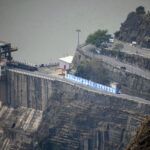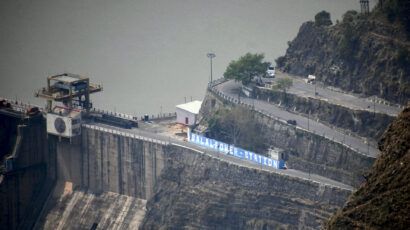The Trident Dispatches No. 2: Protests and presentations
By Rebecca Johnson | February 14, 2007
British Secretary for Defence Des Browne is a man on a mission. In recent weeks, he’s participated in some carefully choreographed meetings in London on Trident replacement, followed by a general debate on defense in the House of Commons and an appearance before the Parliamentary Defence Select Committee.
British Secretary for Defence Des Browne is a man on a mission. In recent weeks, he's participated in some carefully choreographed meetings in London on Trident replacement, followed by a general debate on defense in the House of Commons and an appearance before the Parliamentary Defence Select Committee.
Invited as the principal opposition speaker at a meeting of "center-progressive" Labour Party members in the Palace of Westminster on January 22, I heard the defence secretary’s case at close quarters. He was genial, respectful of different views, and clearly doesn’t like nuclear weapons. In his view, Britain possesses an "independent nuclear deterrent." He argues that this deterrent has kept the nation safe for 50 years, and its replacement is necessary to keep us safe for the future. Browne dodges concerns that extending Trident for several more decades might undermine the nonproliferation regime and breach Britain’s international legal obligations. On the contrary, he asserts that renewing Trident is perfectly acceptable because the Ministry of Defence plans to reduce the number of warheads in store, thereby demonstrating Britain’s commitment to the Nuclear Non-Proliferation Treaty (NPT). Browne also suggests that there is no need to ponder the consequences of actually launching a nuclear-tipped Trident missile because this political instrument is there to ensure that nuclear weapons are never used.
Browne's message–that nuclear weapons keep the peace and won't be used–is meant to reassure. But his case, like the argument made in the Ministry of Defence's white paper "The Future of the United Kingdom's Nuclear Deterrent," is circular, fuzzy, and essentially, incoherent.
Before an audience of academics, students, and the media at Kings College, University of London, three days later, Browne noted that it had been 14 years since one of his predecessors, the Conservative Party’s Secretary for Defence Malcolm Rifkind, gave a "major speech" on nuclear policy at the same venue. On that occasion in November 1993, the Cold War was over and the current Trident system–designed with the Soviet Union in mind–was a year away from entering service. Having decided to decommission Britain’s tactical nuclear forces and desperate to banish criticism from the Labour Party and sections of the armed forces that the Cold War's conclusion rendered Trident obsolete, Rifkind presented his novel new doctrine–Trident could serve a "sub-strategic" role. In this role, single warheads on Trident missiles could perform a "limited nuclear strike in order to induce a political decision to halt aggression." This "unmistakable message" would convey Britain's "willingness to defend our vital interests" without risking a strategic nuclear exchange. A nuclear strike would certainly convey a "message," but unless it was unleashed on a non-nuclear weapon adversary, which would contravene Britain’s security assurances, it would be far from certain that such a strike could be carried out without risking a nuclear exchange.
Indeed, at a meeting some years later with senior officials from the Ministry of Defence and Atomic Weapons Establishment (AWE) Aldermaston, the issue arose of whether the nuclear "warning shot" Rifkind suggested would ever be contemplated. While maintaining that such a threat was "credible," one official commented, "But of course any crossing of the nuclear threshold would be strategic."
Browne used his Kings College speech to repudiate the Rifkind doctrine, though not the option of deploying single warheads: "We have deliberately chosen to stop using the term 'sub-strategic Trident,' applied previously to a possible limited use of our weapons. I would like to take this opportunity to reaffirm that Britain would only consider using nuclear weapons in the most extreme situations of self-defense."
On February 1, Browne opened a defense debate in the House of Commons. (In Westminster, the MPs' rumor mill predicts either the week of March 12 or March 19 for the parliamentary vote on Trident renewal.) Although Browne hardly mentioned the nuclear arsenal, Labour backbencher Jeremy Corbyn raised questions about Trident replacement, leading to a lively discussion involving several MPs. Though their questions and comments ranged widely, three salient issues kept recurring: the timing and process of the decision; the strength of the white paper's case for renewing the Trident nuclear system; and whether nuclear weapons were a relevant, cost-effective means of defending Britain against current, likely, or foreseeable possible threats when compared to security alternatives that the white paper chose to ignore. The secretary for defence gave little response and apparently left the House during this discussion.
On timing, several MPs quoted a previous Defence Committee report that said the final procurement decision did not need to be taken until 2014, an argument strongly endorsed by the Liberal Democrats. Two Labour MPs, Nick Harvey and Peter Kilfoyle, a defence minister in Prime Minister Tony Blair's first government, wanted to know if the March vote would be final or if there would be further opportunities to review options and costs as the security environment became clearer.
Nick Brown, also a former Labour minister, questioned the government's assertion that replacing Trident could be paid for without shortchanging other defense requirements. He raised the case of a constituent who was killed while fighting in Iraq. Citing the coroner's verdict that this soldier’s life might have been saved if equipped with the appropriate body armor, Brown argued that the money earmarked for Trident "could be more usefully spent on conventional armed forces and on specialist antiterrorism units, which could do something to make us safer against the most serious threat."
Another Labour MP, Michael Meacher, said that the case for Trident did not stand up. He paraphrased the white paper thus: "Although nuclear weapons are irrelevant to our current security concerns, and even though we are now in an utterly different post-Cold War environment, we may at some future point, inevitably unspecified, face either a rogue state, a reemerging nuclear Russia, or a nuclear-armed superpower like China." He then pointed out that nuclear weapons had neither prevented nor won any wars for the states that developed them, and suggested that they were unlikely to do so in the future.
Iran's nuclear program was cited with concern by several MPs, some of whom argued that Britain’s decision to renew Trident would send the wrong signal to Tehran. Others, such as Conservative MP Adam Ingram, considered that potential proliferators such as Iran provided justification for Britain to retain nuclear weapons. Conservative Defence Spokesperson Julian Lewis took the floor to dismiss arguments that renewing Trident would undermine the NPT: "We are observing our obligations, and we are not undermining them by continuing to have a minimum strategic deterrent, whereas Iran is threatening to break its obligations."
Although Browne remained markedly reticent about the Trident decision in the House of Commons debate, he was more forthcoming when he spoke to the Defence Committee. He agreed with a committee member's suggestion that Trident was "a political weapon, not a military weapon," but increased confusion by maintaining that it was defense policy to have some "ambiguity" about the precise circumstances under which the nuclear "deterrent" would be used. More on this once the transcripts are made public.
Meanwhile, a warhead convoy that left AWE Burghfield (about 40 miles west of London) on February 5 was monitored by members of the "Nukewatch" network, who tracked the three warhead carriers, their control vehicle, and guards as they headed along Britain's M4 motorway, skirted London on the M25 ring road, and then headed north before tucking into RAF Wethersfield for the night. (Watch a similar convoy from November 2006 on YouTube.) Reminiscent of the Keystone Kops, at one junction, a fire truck in the convoy headed in one direction while the marines who were supposed to be guarding the convoy headed in another. The marines subsequently got lost and had to ask directions from a local policeman. The following day, the warheads were driven up to Scotland and along the A82 before turning off to Glen Fruin, and thence, in the mists, to the Coulport navy depot. They are stored at Coulport before being connected to U.S. Trident missiles and placed on board the submarines.
In Scotland, civil resistance is increasing. On February 8, the number of protesters arrested and detained since October topped the 500 mark, as eight people locked on to each other and blocked the southern entrance of the nuclear submarine base at Faslane (about 30 miles west of Glasgow) for two hours during the morning rush. The protesters that day included four people who live within eight miles of the base and an Edinburgh woman in her wheelchair.
Together, we make the world safer.
The Bulletin elevates expert voices above the noise. But as an independent nonprofit organization, our operations depend on the support of readers like you. Help us continue to deliver quality journalism that holds leaders accountable. Your support of our work at any level is important. In return, we promise our coverage will be understandable, influential, vigilant, solution-oriented, and fair-minded. Together we can make a difference.
Topics: Nuclear Weapons















